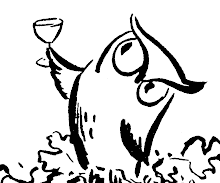Twitter can
be used in different ways. I will give a short overview and write about the
possibilities and limitations inherent in this platform.
The
generalities
The limit
of 140 characters per tweet has lead to a new art in the use of wording,
grammar and abbreviations. It´s also interesting to compare the content you can
put in one tweet by using different languages. I find it most pleasant to read
a statement made in a single tweet and not broken up in several ones. Of course
that´s not always possible but I try to keep my statements within this limit.
Having said that, I have to admit that I´ve always been a fan of keeping things
short and to a point.
Tags are a
great way to follow broadcasts about an event and a good tool to shorten
tweets. I wish I could use them in real life, too.
The
publicity of the things you tweet can lead to interesting conversations when
people you didn´t expected to, suddenly chime in.
The
possibility to send direct messages as well as to protect your account gives
you the possibility to use several degrees of publicity for your messages.
Social
network
The
possibility to describe yourself on your account page and the suggestions whom
you might want to follow can lead to the creation of a network of people who
share one or more common interests. The people belonging to this network will
often be quite diverse regarding their location, culture, life-style and
political views. This seems to be different from other social networks such as
Facebook for example, where the people added as friends first and foremost tend
to be people you know in real-life like friends, relatives, colleagues and so
on.
The form of
communication in this aspect of Twitter tends to be dialogical. The tweets sent
are either directed at someone in special or your followers in general but more
often than not you expect them to be part of a conversation through replies or
at least retweets or favouritings. The content ranges from very personal
messages to general information you think might be of interest for your
followers. Taken together, this aspect of twitter can build the core for a more
or less close group of people, most of whom you’ll probably never meet, for discussing
various issues, letting people know about your thoughts as well as your lunch,
and learning about the lives of others.
What has
been expressed repeatedly on the net is the fact that people use to tell things
on Twitter that they wouldn´t on Facebook. As the reason for this I tend to see
the fact that you normally don´t personally know the people you´re talking to
on Twitter and the fact that you can use pseudonyms here and any “confessions”
you make can´t be directly traced back to you if you take care of that.
Another consequence
is that the people you “know” on twitter don´t see you the same way as the
people you know personally. When you ask for advice, people you know irl will
include in their answer, consciously or not, all the things they know about you
and the things they have experienced with you. They will see you through a
certain set of glasses, if you will, and thus exclude answers they hold to be unsuited
for you. They may also think about the consequences their advice will have for
them. People on Twitter will know far less about you and only things you
decided to let them know. Advice given by them will be more objective, but on
the other hand also much more general and less suited for your specific
situation and personality.
What you
have to bear in mind when dealing with people on Twitter is that everything
they tell you could be fake. Another problem might be that you will probably
never meet them in real life. Both things are of no consequence as long as you
only want to talk about shared interests in music or films, but it can lead to
troubles if you get too attached to them. Keep yourself aware of the fact that
in most cases, a conversation is the only thing you will have with these
people. A good advice is to always keep yourself grounded in real life and to
see your virtual life as an addition to that rather than a substitute for it.
Announcements
Another way
to use Twitter is a mostly monological form of communication. A tweeter sends
messages to his followers without much regard to replies. This method is used
by celebrities (people with more followers than they could possibly pay
attention to) and companies or organizations. It´s a good tool for the
marketing of products as well as ideas. On the part of the followers though,
this often leads to exaggerated hopes.
In theory, twitter gives you the possibility
to directly send messages to famous people, but with a probability of 99.9%
these messages will simply be ignored. Even if he/she gives you a followback,
that will almost always mean he/she will follow so many people that he/she
won´t be able to read all the tweets in the timeline. So if you follow an idol
of yours, be prepared that this will be no more than a one-way street of
communication.
Conclusion
Before
getting started on Twitter you should ask yourself what you expect from your
stay there and what you can and shouldn´t do to achieve that.
-
Is the
number of your followers really important to you?
-
What
does it say about you, when you follow or get followed by hundreds or even
thousands of people?
-
Do you
want to simply read/hear/watch what others post or do you want to have
conversations with people?
-
Are
the things you post really interesting for your followers?
-
Think
twice before you reveal personal information on a public platform as this.

No comments:
Post a Comment